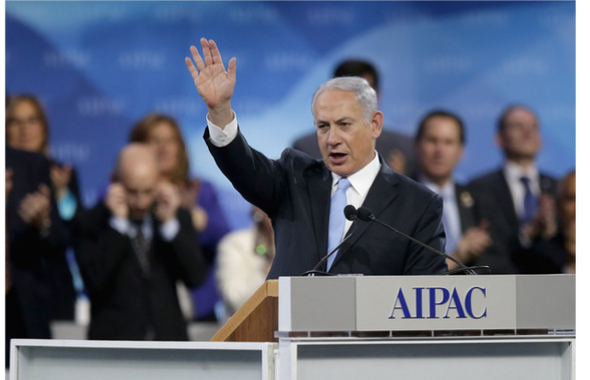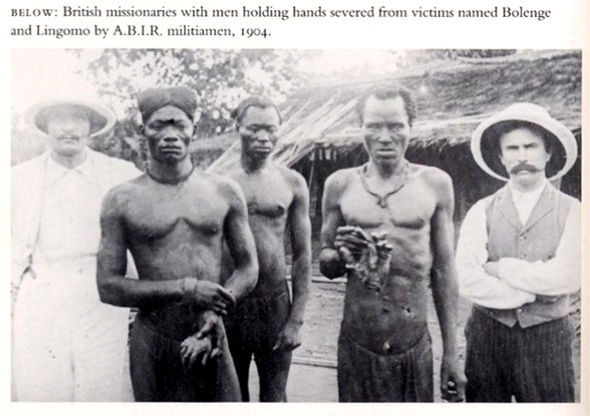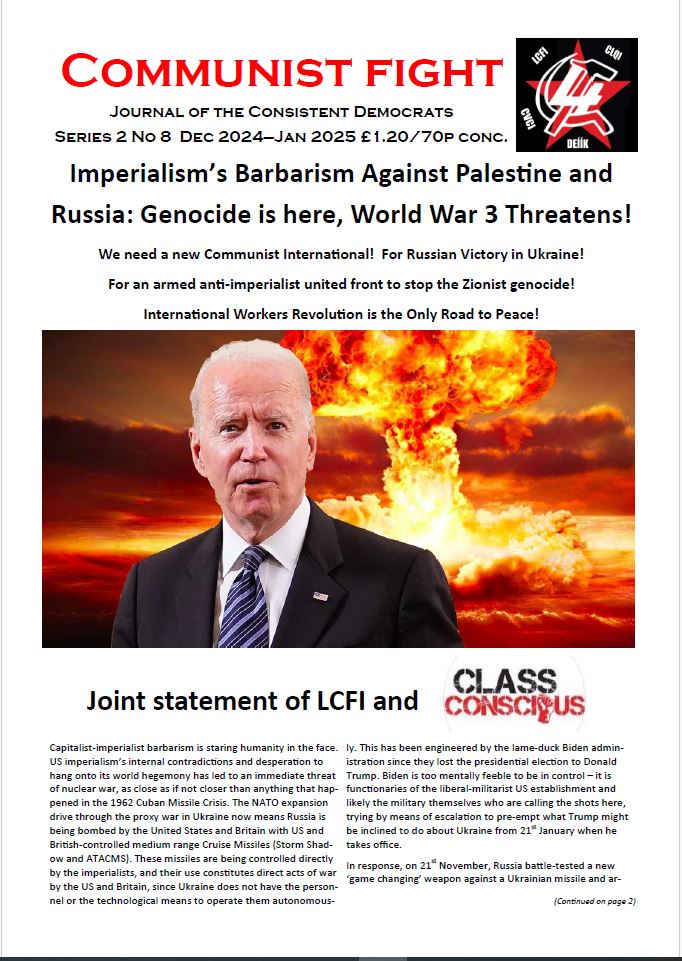
This set of theses will be presented for discussion at the meeting on 14th September of the Communist Platform of Left Unity
(Also available en Francais, На русском языке)
1. Of all the advanced capitalist/imperialist countries today, Israel is second only to the United States in the threat it poses to the future of humanity. It is an artificial imperialist entity introduced into the Middle East from without, and consolidated though the expulsion of the bulk of the indigenous Palestinian Arab population. As a result it is in a state of permanent conflict with the Palestinians, who have a dual national consciousness both as Palestinians and as part of the national aspirations of the Arab peoples of the entire Middle East.
Israel is built entirely on territory stolen by force from a native population that is on a much higher cultural level than the indigenous victims of earlier settler states associated with European colonialism, such as the United States and Australia. Its conflict is with Arabs who have a modern national consciousness and greater cohesion than virtually any dispossessed indigenous people. Israel has therefore armed itself to the teeth and become a garrison state, stockpiling likely hundreds of nuclear weapons, and threatens the population of the semi-colonial Arab states that surround it with destruction should it fear loss of supremacy.
2. What is distinctive about Israel is that, unlike earlier settler states populated by colonists from imperialist nations that conquered them as part of an imperial project, Israel has no ‘mother country’. It was populated by part of the Jewish population from several countries, as part of a deal by the Zionist movement with British colonialism during the First World War. The Zionist movement being a unique nationalist movement politically led by part of the Jewish sections of the bourgeoisie in several advanced capitalist countries. This deal led over three decades of British colonialism and gradually accelerating Jewish immigration, in the context of the Nazi mass murder of European Jewry during WWII, to a reactionary war of national independence partially against the British, but mainly against the Arab population.
With conventional settler states, that have a ‘mother country’, the character of that power plays a major role in determining the character of the settler state that subsequently emerges. But in a sense, Israel’s ‘mother country’ is the Zionist movement itself, not Britain, which only played an enabling role in the foundation of Israel by a third party movement. Therefore, the character of the Zionist movement itself is decisive in determining the character of Israel.
It is crucial for communists particularly in the Western imperialist countries, Israel’s bankrollers in terms of aid, and armourers, to have a clear conception of the forces in the world that are supporting Israel in its war against the Palestinians. This is because, unlike the West’s allied dictatorships, from whom the ruling classes are compelled to maintain a certain political distance, Israel is openly embraced as a so-called ‘democracy’ and treated as a part of the ‘family’ of ‘civilised’ nations. This means ignoring that Israel’s Jewish ‘democracy’ was achieved by expelling the majority of its Arab population; without this expulsion a Jewish state would be impossible. For communist internationalists, no stone can be left unturned and or question considered taboo in exposing the real bases of support for the oppression of the Palestinians in the Western countries. To fail to do this is to betray internationalism and the Palestinians.
3. Empirical observation alone shows that Israel has organised bases of support within the ruling classes of several imperialist countries, centrally the United States, and those in Western Europe (including the UK). In the US, AIPAC (American-Israeli Political Action Committee) operates with great influence in both political parties; in the UK, there are powerful ‘Friends of Israel’ factions in all three major parties; the Conservative Friends of Israel in particularly embraces 80% of Tory MPs. This is a staggering level of sponsorship from the main party of the British ruling class; it is echoed in the other parties and this pro-Israel ideology has a similar level of hegemony to Cold War anti-communism among the ruling class.
This ruling class support has a material basis, and not just in terms of old-fashioned imperialist realpolitik. As the late Israel Shahak, genocide survivor and decades- long defender of Palestinian rights within Israel, wrote in a very important work on the Jewish question:
“US support for Israel, when considered not in abstract but in concrete detail, cannot be adequately explained only as a result of American imperial interests. The strong influence wielded by the organised Jewish community in the USA in support of all Israeli policies must be taken into account in order to explain the Middle East policies of American administrations. This phenomenon is even more noticeable in the case of Canada, whose Middle Eastern interests cannot be considered as important, but whose loyal dedication to Israel is even greater than that of the USA. In both countries (and also in France, Britain, and many other states) Jewish organisations support Israel with the same loyalty which communist parties accorded to the USSR for so long. Also, many Jews who appear to be active in defending human rights and who adopt non-conformist views on other issues do, in cases affecting Israel, display a remarkable degree of totalitarianism and are in the forefront of defence of all Israeli policies. It is well known in Israel that the chauvinism and fanaticism in supporting Israel displayed by diaspora Jews is much greater (especially since 1967) than the chauvinism shown by an average Israeli Jew…” (Jewish History, Jewish Religion: the Weight of Three Thousand Years, 1994, p102).

The influence Jewish organizations are able to exert in imperialist policy is not the product of the ‘Jewish vote’ or even some mysterious ‘lobbying’ power at their disposal, as is euphemistically said by some critics who fear being falsely accused of racism. The Jewish vote in imperialist countries is electorally tiny. In the US around 2% of the population are Jewish, and there is no reason, is strictly numerical terms, why a ‘lobby’ based on such a small percentage of the population should have the power not only to force American governments to adopt the most slavish support for very brutal actions of Israel, but also to destroy the careers of politicians who speak out against such actions.
4. It is however, explained by one salient fact: Jewish overrepresentation in the US and other ruling classes. For the United States, which is the most powerful state in human history, you can easily find informed Jewish sources that place the representation of Jews among billionaires, the most powerful elements of the capitalist elite, at between 40 and 48% – nearly half (for example see http://www.jewishworldreview.com/joe/aaron101007.php3). This is the only logically coherent explanation for the power of the so-called lobby. It must be faced fearlessly by Marxists, irrespective of any discomfort that may result from confronting the widespread prejudice (for that is what it is) that to mention, let alone try to analyse, such factual matters is in some way racist. To ignore them in this way is itself an act of betrayal of those on the receiving end of the crimes that result from this state of affairs, and in that sense a chauvinist position.
A materialist analysis of why this is the case is crucial. This is a very complex and difficult question, and there are enormous social pressures on those who would try to analyse it. The history of genocide against the Jews in the first half of the 20th century is ruthlessly used by propagandists for the Zionist project to justify today’s crimes against the Palestinians. Not only that, but in the earlier period anti-semites exploited the atypical social structure of the Jews – their overrepresentation in business and finance – as an important component of the paranoid, racist ideology that led to the Nazi genocide in Germany and Europe. This history is also exploited today against critics of this phenomenon. However difficult this makes addressing today’s problems in this regard, the challenge of producing a coherent materialist analysis of them cannot be ducked. Today, as Palestinians face regular one-sided massacres and the threat of mass population expulsions, and the wider Arab and Middle East faces the real possibility of a nuclear genocide at Israel’s hands, solving this very tricky ideological and political problem is possibly the most crucial, strategic task that communists have to solve. If we can’t confront this, we may as well give up any pretence of communism and revolution.
5. Fortunately, there is a materialist, Marxist tradition we can draw on in analysing the origins of this. In its most developed form this was developed by Abram Leon, a young Jewish Marxist, during the Second World War. His work The Jewish Question, a Marxist Interpretation is the classic Marxist study of Jewish history, basing its starting point on Karl Marx’s earlier sketch of this question. Beginning in antiquity, Leon’s work most directly relates to the period from early medieval times to that of early imperialist capitalism. His analysis is of the Jews as a ‘people-class’, whose very survival as a people since antiquity was bound up with their role as the repository of merchant’s capital, commodity distribution and therefore foreign trade in fundamentally feudal society, where the dominant mode of exploitation involved the production of use value, not exchange value. Trade was therefore regarded as a separate activity, outside the social norm, that could best be confined to practitioners of a ’foreign’ religion.
This is somewhat different to the question of usury, which only became dominant among the Jews with the decline of feudalism and the rise of commodity exchange as an increasing norm. This brought the rise of ‘native merchants’ etc., which pushed the Jews to the margins of commodity exchange in the form of usury, which was regarded as a socially odious activity.
Leon noted that in the early period of feudalism, the Jews were in fact often highly privileged due to their specialist trading role. Later, as their role shifted to usury, tax-farming, etc., they became exploitative intermediaries that were often hated by the exploited peasantry. On more than one occasion, events that are often regarded as pogroms were in fact peasant revolts against exploitation. In the later feudal period this had a dynamic that led to the Jews retreating into ghettos and/or being driven from country to country as their economic role became increasingly superfluous. This happened at different times in Western and Eastern Europe, so there is quite a complex tapestry of events that needs to be understood. In Eastern Europe, this period of Jewish decline and oppression coincided with the beginning of the decay of capitalism.
In the early capitalist period, a key achievement of the bourgeois revolutions was the opening up of the ghettos, and a beginning was made to the assimilation of the Jews, the logical outcome of the redundancy of this medieval trading class. However, with the end of the epoch of progressive capitalism, this came to a halt and you had the rise of racialised anti-Jewish sentiment. Leon witnessed the growth of this hatred, and the rise of Nazism, and projected that the Jews would remain pariahs, and that status would only be relieved through the overthrow of capitalism.
Unfortunately Leon did not live to see the foundation of the state of Israel, and thus to be able to analyse the Jewish Question in the post WWII period. He perished in Auschwitz in 1944, at the age of only 26. His writings about history were spot on; his speculations about future developments were not, since Jews are no longer pariahs but have been re-absorbed by later imperialism in a different political situation. But given that his historical analysis was correct, it ought to be possible to pick up the threads from where he left off and, using the same method, analyse the current situation correctly.
6. The redundancy of any class, including a people-class, results in its dissolution and its members’ absorption into other classes. This process began with the emancipation of the Jews after the bourgeois revolutions as laid out by Leon and referred to above. Members of the former people-class were absorbed into the bourgeoisie, the working class (particularly as an artisan-proletariat), and various layers of the urban petty-bourgeoisie. As a people with centuries of experience of trade in commodities – that is, in the operation of merchant’s capital – prior to the capitalist era proper, they had major cultural advantages for operation within the bourgeoisie. They had more accumulated ‘cultural capital’ in the spheres particularly of trade and finance than the mainstream ‘native’ bourgeoisies of the nations they were beginning to integrate into.
In the early stages of capitalism, this did not matter, as the system was growing so strongly that there was room for many in the developing capitalist classes that were coming to dominate what became the Western countries. Jewish bourgeois prospered together with other bourgeois and assimilation appeared to be making good progress. But with the beginning of capitalist decline in the late 19th Century, suddenly it was not so rosy. With the narrowing of capitalist growth, the advent of depression, something similar to what happened in the mid-medieval period recurred.
In mid-medieval times the Jews were seen as insidious competitors by a rising ‘native’ class of merchants, who proceeded to drive them out of the mercantile field and into the degraded field of usury. In the later 19th Century, Jewish capitalists were seen in a similar way by many ‘native’ capitalists in Europe, and though they were not driven out in the same way, this hostility became one of the source components of modern anti-semitism.
This would probably have died down in time without another source component of the same anti-semitism – bourgeois hostility to the role of the Jews in the working class movement. Because the Jews had been an oppressed pariah class under late feudalism, those sections of the former people-class who did not make the transformation into the bourgeoisie itself became among the chief exponents and subjects of a genuinely progressive, working class radicalisation. Both Jewish workers and Jewish intellectuals played a crucial role in the revolutionary wing of the labour movement in many countries.
One has only to mention Marx, Trotsky, Luxemburg, Jogiches, Joffe, Zinoviev, Kamenev, Abram Leon, and many more sterling leaders of the working class who were of Jewish origin. Thus the revolutionary Jews were hated by the bourgeoisie at the same time as the bourgeois Jews became regarded by many ‘native’ bourgeois as dangerous upstarts who were too successful in business for their liking. Then you can add a third component to this: the fact that Jews had played a significant, if secondary, role in earlier emancipatory events such as the French Revolution earned them the enmity of forces that still existed that were hostile to the legacy of the bourgeois revolutions themselves, such as most notably the Tsarist regime in Russia, as well as elements of the aristocratic Junkers class in Germany.
Then there was yet a fourth component, which was then subordinate but is much more important today with the existence of Israel and its role in the world. There is an undeniable element of anti-gentile hatred and bigotry among quite a few Jews that is symmetrical to anti-semitism, a belief that non-Jews are not ‘chosen’ and therefore inferior, and can be treated with contempt. This comes from Rabbinical teachers and some scripture. Obviously the progressive, revolutionary Jews did not hold with that, but it existed among the rabbis and the more conservative Jewish elements, and could be caricatured by the proponents of anti-semitism in roughly the same manner that Islamophobes today caricature some of the more strident passages from the Qu’ran, Hadiths, etc. to demonise Muslims.
These are the four main factors that gave anti-semitism its potency from the late 19th Century onwards. To cut a long story short the proletarian component of what the classic anti-semites saw as the joint conspiracy of the revolutionary and bourgeois Jews was wiped out in Europe by the Nazis and their supporters in other countries particularly in Eastern Europe. In Germany the bourgeois Jews were largely wiped out also, but not in the rest of the world, and not particularly in the United States, where the Jewish bourgeoisie was already quite influential and became much more so as time went on, particularly since WWII.

There is no moral judgment contained within the observation that Jews are overrepresented in the bourgeoisie of the United States and other advanced countries. It is simply a material fact with certain implications for politics. If there were no quasi-nationalist consciousness, no sense of common purpose, it would have no significance whatsoever. What makes it significant is that they do have such a common purpose today, and also a common project, which is manifested in Israel and Zionism. This is significant to those on the receiving end of Israeli oppression, and their sympathisers.
7. Virtually all accounts of the birth of Zionism in the 19th Century, including that of would be Marxists, talk of Zionism as simply a reaction to the birth of anti-semitism, and do not seriously analyse the class nature of the Zionist project. This is not spelt out; the birth of Zionism is simply put down to amorphous ‘Jews’ in general, making a mistaken response to anti-semitism that has reactionary implications.
This is not enough in terms of analysis. The fact is that Zionism always was a quasi-national movement of the Jewish bourgeoisie, which had been initially pretty painlessly successful in gaining a major share of the fruits of expanding capital in the era of progressive capitalism, only to see this come under threat when the imperialist epoch began. The problem is that this bourgeoisie did not have a territory to build a nation around. And in any case, it was not necessarily in favour of migrating and tearing out its roots in other countries even if a territory were somehow miraculously given to it. But it felt it needed a territorial asset, a home base to call its own even if it did not want to reside there all the time. This is easily comprehensible in terms of bourgeois consciousness and a Marxist understanding of the national question, it just demands a degree of flexibility in the understanding and application of Marxist tools of analysis, that can be most effortlessly applied to other, more straightforward national questions.
In the early period of Zionism, obviously this quasi-national project appeared problematic and there was not unity among the Jewish bourgeoisie as to whether it was viable or not. But the project was bourgeois, and was extensively funded by part of the Jewish bourgeoisie abroad, particularly in the USA. The lack of unanimous Jewish bourgeois support for the Zionist project in the earlier period meant that it had to rely on support from various pseudo-left Zionist currents, those who manifested nationalist deviations from the revolutionary impulses that drove the genuine elements of the communist and socialist movement who happened to be of Jewish origin. Thus when Israel was founded, its original leaders were dominated by the fake-left nationalist trend. But despite that, the real nature of the Zionist project was thoroughly bourgeois and reactionary; that disjunction between consciousness and reality has long since been resolved through the decay of the fake-left Zionists and the dominance of the open right. The ‘left’ always served a cover for the right, but now they are a pathetic fig-leaf for it.
The Jews are not a nation, but they have a pan-national bourgeoisie that had national aspirations and wanted a territorial asset to give expression to that. Once that territory was actually created, through manoeuvres with the imperialist powers, it led to a transformation of the situation. Israel’s ‘Law of Return’ gives all Jews who fit Israel’s criteria of who is a Jew, anywhere in the world, automatic citizenship rights. That legal right to Israeli citizenship is a material force, which gives some people power over and in preference to other people. It gives Jews overseas implicit power over the Arab inhabitants of Palestine. It does not make Jews a nation in the sense of Stalin’s famous definition of a nation in Marxism and the National Question, which still arguably contains the correct Marxist definition of a nation. But it is a material change that confers legal, national rights. It therefore means that Jews, under the hegemony of their own bourgeoisie as most other peoples of the world live under the hegemony of their own bourgeoisies, constitute a semi-nation under that hegemony.
8. There is a common ethnocentric project between the ruling class of Israel and the various hegemonic pro-Israel bourgeois Jewish organisations in a number of imperialist countries, centrally the United States. This pan-imperialist Zionist bloc within the bourgeoisie plays an active role in the oppression of the Palestinians. This bourgeois current, which extends from the ruling class of Israel to penetrate deeply into the US ruling class (and to a lesser extent the ruling classes of several European imperialist countries also) has some of the attributes of a national bourgeois formation without a single territory exclusive to itself.
It is therefore both a powerful imperialist formation, and deeply unstable. In this epoch of declining capitalism, it plays the role of a kind of ‘vanguard of the bourgeoisie’ – not quite the mirror-image of Marxism but with aspirations along those lines. It has been instrumental in pushing the nationally limited imperialist bourgeoisies to partially transcend their own national particularisms. Hence the ‘traditional’ imperialist bourgeoisie, based on the nation-state, having overcome their previous fear of the supposedly proletarian-internationalist role of the Jews as a result of the outcome of WWII, now regards Jewish ‘cosmopolitanism’ and bourgeois semi-internationalism as a good thing, and to a considerable degree defers and follows the leadership of the Jewish/Zionist bourgeoisie.
But this is unstable, and depends for its coherence on the maintenance of Israel as a Jewish state. Without that ethnocentric entity in the Middle East, the Jewish layers in the ruling classes in the imperialist countries would have no focus to unite them; their ‘internationalism’ (in reality tribalism) would collapse, and the Jewish bourgeoisie would simply over time disappear through assimilation into the national ruling classes of the imperialist countries. This bourgeois caricature of internationalism would collapse.
Hence the rabid support of Israel by the bourgeois Jewish-ethnocentric fractions in the imperialist countries, their ability to maintain broader bourgeois support, and the failure of more seemingly rational voices in the ruling class to prevail over them. This represents a kind of bourgeois class instinct as to its interests against the proletariat, giving it additional political weapons against the genuinely internationalist aspirations of the working class movement. Unfortunately, due to inadequate political leadership, the left has until now failed to correctly deal with this problem.
9. Understood properly then, maintaining Israel’s status as a Jewish ethnocracy is a strategic necessity for the stability of world capitalism. Conversely, for the same reasons, the dissolution of this ethnic tyranny and the assimilation of its Jewish population into a state of affairs where all of its inhabitants and refugees have equal political rights over all of historic Palestine is a priority of the working class worldwide.
10. There is no ‘Jewish problem’ in the sense that the racist movements of the late 19th and early 20th Century tried to make out. There is however, by means of the activities of the Jewish bourgeoisie, an additional factor of complexity in the relations between the imperialist ruling classes that in its distinctive way, threatens the world with barbarism in a novel and unexpected form. This is why, in many ways, the Israel/Palestine question is presently the most crucial and strategic question of world politics.

